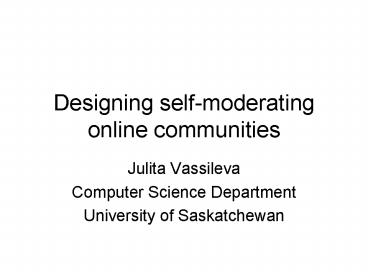Designing selfmoderating online communities - PowerPoint PPT Presentation
Title:
Designing selfmoderating online communities
Description:
Formerly: 'newsgroups', 'forums' or 'message boards', 'blogs' Now: 'virtual / online communities', 'social software', even 'social computing' ... – PowerPoint PPT presentation
Number of Views:84
Avg rating:3.0/5.0
Title: Designing selfmoderating online communities
1
Designing self-moderating online communities
- Julita Vassileva
- Computer Science Department
- University of Saskatchewan
2
Outline
- Why do we need self-moderating online
communities? - Existing self-organizing communities
- How do successful communities work?
- Case study the Comtella community
- Motivating participation
- Self-regulating the quality of contributions
3
Online communities
- Formerly newsgroups, forums or message
boards, blogs - Now virtual / online communities, social
software, even social computing - People send messages, questions, answers.
- Anyone is free to sent anything
- Everyone can see the all the postings.
4
(No Transcript)
5
(No Transcript)
6
Too much stuff
- And sometimes bad stuff
- How to find what you want?
- need to organize the postings
- a moderator of the newsgroup
- worked well with small groups
- It is important to design software and the rules
of the game for self-organization by the
participants. - For example, Orkut allows joining only by
invitation from insider. - A classical example Slashdot.org
7
(No Transcript)
8
Self-organizing online communities
- Slashdot.org
- A Linux-geek newsgroup/discussion forum
- Users can ask questions and give answers to
others questions - Users can rate the answers and the questions
- Users who ask good questions or give good answers
earn karma - Ratings by users with high karma have more weight
- Every user has only a limited amount of ratings
to give (depends on the karma-level) - Users with high-karma have the privilege to be a
moderator for some time - Result excellent forum, good quality postings
are visible, low quality postings are not easy to
find. Everyone has a chance to build up his/her
karma. A form of democracy, people-ruled.
Maintenance costs close to zero
(self-organizing).
9
The EPS Game (from CMU)Louis von Ahn, Laura
Dabbishhttp//www-2.cs.cmu.edu/biglou/ESP.pdf
- Goal to label web images
- Why? Try to Google image with a car
http//www.google.com - Two players (random) are shown the same image
- Each player has to guess how the other player
will label the image (have 2.5 minutes per image) - If their guesses are correct, both score and move
to next image - Players can not communicate (otherwise they can
cheat)
10
Player 1 guesses Handbag Player 1 guesses
Purse Success! Agreement on Purse
Player 2 guesses Purse Player 2 guesses
Brown Player 2 guesses Bag Success! Agreement on
Purse
After agreeing on 15 images big bonus of points
for both players.
Example from http//www-2.cs.cmu.edu/biglou/ESP.p
df
11
Features of successful online communities
- Need to serve some real users needs
- Need to have a critical number of users
(critical mass) - Need to have a constant stream of new information
- Examples KaZaA, Blogs, Orkut
12
How to achieve this
- Need to cultivate in the user the feeling of
being a member of the community - Contribution to the community should be rewarded
- With reputation (ranking)
- With visibility
- With more rights / privileges
- With cash
- Harmful behaviours (cheating) should be punished
- The success of every social system depends on
having the right motivators and the right
inhibitors to stimulate and regulate individual
behaviour!
13
Case study Comtella a P2P system for sharing
papers
14
First deployment in CS DepartmentFall of 2003
- Main problems
- Ensuring participation - unable reach critical
mass - Motivating users to contribute new papers
- If there is no one on-line, you cant find
anything - If no one contributes new papers, very soon
everyone will have the same papers, so no point
in using the system
15
New deployment 4th year Ethics class, 35 students
- Users earn status by participating. They need
to - bring new resources in the system
- comment on the resources they have seen
- keep online
- log on the system frequently
- download resources (share them with others)
16
(No Transcript)
17
Status
Gold
10
60
Silver
- High-status users are rewarded with
- Visibility in the Community (visualization)
- Better search options
- Low-status users (free riders) are punished
- Visibility in the Community (Hall of shame)
- Not so comfortable search options.
Bronze
30
18
Community visualization
Hall of Fame
Hall of Shame
19
Results
BUT, also some poor contributions - not really
relevant links - links similar to other
contributions ? clearly, many students were
trying to submit as much as possible to get a
higher status (a form of cheating)
20
How to deal with the decrease in quality of
contributions?
- Measure quality
- Track how many people download a contribution and
how they rate it (like Impact factor) - Reward users for rating contributions
- Track cheaters
- Compute a reputation of a user as a contributor
and as a rater - Reward quality good users become moderators
- Give status points
- Give more rates to give away and higher weight of
these weights (like Slashdot) - Punish poor quality
- Lower status, lower weight of ratings, less
ratings to give - Less visible contributions































